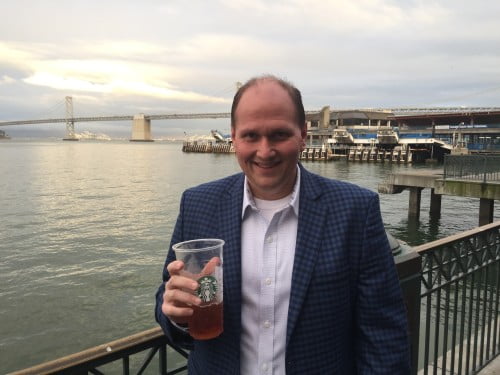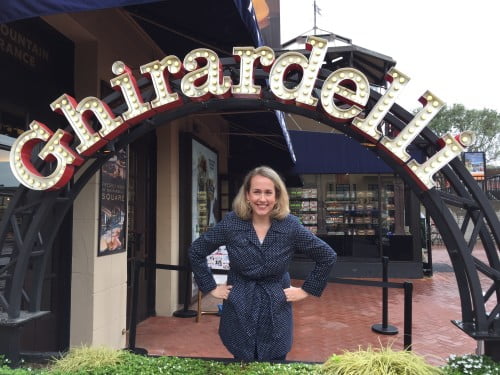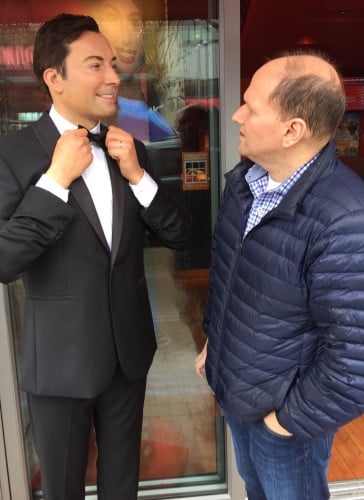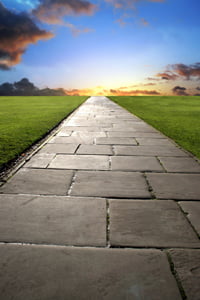"What is it like to be married to Kevin?"
I've been asked this question a lot over the past 4 years since Kevin became the Chief Executive Officer at Feed the Children and now at the American Diabetes Association.
Not only is Kevin one of the most dedicated men I know-- being driven toward growth and transformation in all he does which takes a lot of time-- but the demands of the role are great by nature.
Since becoming CEO of these two organizations, hundreds of stakeholders whether they be board members, industry partners or employees all beg for his time on a daily basis. Everyone wants an email reply in . 5 seconds after they send it. Every phone call in his "to be returned" list seems to be urgent. No evening or weekend is sacred. Ever.
It's a balancing act for sure, as I watch, him do it and carry the weight of the world on his shoulders. And it's a lot of weight! Especially leading a mission driven organization, the stakes are high! So in this environment. . . our days of rest together are few.
Yet as much as I know marriage only works when I'm 100% on his team (and he mine) . . .
I'm learning to help him (and us) find them and savor these moments, even when they arrive on days we wouldn't expect.
A week and a half ago, Kevin and I found ourselves in San Fransisco, CA for the American Diabetes Association's annual Post-Grad course. Over 500 doctors, educators and pharmaceutical representatives all gathered for several days of meetings, lectures and time to be together to talk about the latest research in the diabetes world. I traveled there to help Kevin host a reception with some of the industry partners and be a part of other conference events.
As an aside, it's amazing front row seat (literally) I've been given to learning about this horrific disease and hearing first hand the stories of those living with its hardships every day. It most certainly keeps my brain churning in new ways about how the church can better serve those living with diabetes (since that's my vocation).
So all this to say, I didn't expect to have any free time during our trip, especially with Kevin. 
But somehow the stars collided and it happened. We had one morning and part of the afternoon off together. Just the two of us. It was a miracle!
And as we wandered the streets of San Fran doing what we love most: window shopping and nibbling our way through a meal (and of course stopping at every Starbucks for Kevin's tea refill), I felt like we had our first day of rest in a long time. It was fun. It was play. And I realized how little of this we do anymore.
But how much both of us need it. 
The body needs rest. It needs diversions. And couples need rest and excursions together. Play is good for the soul as much as medical professionals tell us it's good for the brain.
So when we got home last week I made a point to bring it up this very topic with Kevin. I told him we must plan another "just you and me" day. And he agreed. We can't go that long again. And I think we've found another date to look forward to.
Even the types of us that think we get a pass . . . business owners, pastors and CEOs too.
We've all got to make time for play even if it just trying to figure out if this was really Jimmy Fallon or just a traveling exhibit from Madame Tussaud's. 
 We can't help it, but in our society we are what we do.
We can't help it, but in our society we are what we do.
When you meet a new person (especially in the circles I run in it seems) the first question that gets asked when you meet someone new is, "What do you do?"
And in response free-flowing answers are something like, "I am a lawyer. . . . I teach school. . . . I work for the government. . . . I direct an organization."
When we hear these responses and other similar to them, we nod our heads in approval and say with our body language and sometimes our words: "Oh, good. That sounds interesting. How long have you been doing that?"
But then there are those responses we can give like: "I consult."
"I'm a stay at home mom."
Or, "I'm a writer" that usually seem to evoke less than energetic responses.
Some of us don't understand how a person could just consult or just stay at home with their kids (aren't they wasting their talents by not pursuing traditional full-time work?), or we think, "Isn't saying you are a writer code for you don't know how to get a real job and that you sit in your bathrobe and eat chocolate all day?" (Yeah, you know you think it even if you don't say it).
But what if you are called to be a generalist consultant or a stay at home mom or dad or heaven forbid even a real writer?
I sat at a coffee meeting with a new colleague on Monday. Catherine is a consultant for social media (something I'm doing more and more of these days) and self-employed too.
We talked about the frustrations of being in an office of one, doing helping work through writing and social media for non-profits (and folks not wanting to pay for our services, ugh!), and how easily our value in the society in which we live is tied to what we do.
In response, Catherine offered this nugget of wisdom that she's known to share with groups during one of her training sessions: "Don't worry about being something. This will get you nowhere. The someone who you think you are because of a job could change at any moment. The title you have on your business card will not be with you forever. Instead, put your energy into being someone. This is who you are that will never change."
I was struck by the simplicity but depth of her words. I may not be the something that I once was, but I am a somebody.
My friend, Ken and I were talking about this very thing a couple of night before. I was bemoaning the fact that I often feel like a "nobody" since I left the church and don't have an official title of "I pastor ____ church" to add to my name. And Ken pushed back. "You are a somebody. And you are doing important work. You just don't see it like the rest of us do. . . . "
And then came Catherine's words about "being someone instead of something."
Clearly I needed to hear such a message.
It's a hard road and most certainly the path less traveled, I believe to find yourself outside of the confines of a role or a particular job. Ask someone has recently started a new business or who has retired early how they're feeling about the transition, and you'll know I'm speaking truth here.
You don't win the "most impressive" award when you meet new people at a happy hour or a professional gathering with a non-traditional "what I do" response.
Instead, you have to brace yourself for the stares, the strange tones of folks reactions, and comments hurried your way like I recently got, "Do you like being a housewife?" (Ok, I almost died. No, I am NOT a housewife).
But, I am a someone. And so are you-- in whatever you do.
Last night I was talking to my friends Tim and Debbie. In the course of the conversation about vocation and what it means to enjoy life at the fullness that life can really be, Tim chimed in to say, "I've always thought about life like this: who you really are is what you do when you aren't at work."
And while there are all different sorts of implications for vocation and paid work interlacing and certain people's 9-5 "It pays the bills" sort of jobs having all different levels of meaning for us-- I think Tim is right.
We have clues to the "someones" that we truly are if we notice what we are naturally drawn to in our free time.
And it is not that we become these things, such as, "I am a cook." "I like to garden." Or, "I am so happy when I get to keep my grandchildren" but that the character qualities that motivate us to do these things shine through. And we see more clearly our souls.
We are challengers (or not).
We are contemplative (or not).
We are relational (or not).
And these things do not change. We simply are.
We were created with value and purpose and uniqueness. We can be a someone no matter if our work is validated, paid for or even appreciated. We can find fulfillment in simply BE-ing.
I'm not there yet. I really like being a something better than someone. But, I'm on my way and I wonder if others of you out there are too?
But I can't seem to get these boys we met in Africa out of my mind because as many of you know, some of the greatest gems of experiences take time to sink in . . .
One of my favorite experiences of the Kenya trip Kevin and I took last year was the time spent with the young men of the Hardy House-- a group of 20s and 30s something young men with special needs. They'd lived in the FTC orphanage in Nairobi since childhood but who had aged out of the system with nowhere else to go. (Thus, the "Hardy House" was created for them to live in for the rest of their life).
Over the course of two days, we shared a dinner with them. We slept in their guest room. We woke up watching the cartoon "Fat Albert" on their tv and laughing with them.
When it came time for us to leave, the Hardy Boys became serious: "Could you take us back with you to America? . . . Could you find us work there? We just want to do something . . . We want to feel useful."
While the "take us back to America with you" part was expected (for those of you who've traveled overseas in the developing world know that this is a common request made by folks desperate for a way out of poverty), the "we just want to do something . . . we want to be useful" part surprised me. Because before us sat young men who were blind, deaf, and full of mental and physical challenges of all kinds.
I wondered in the moment: "How did they know that they weren't useful? Weren't they satisfied to be in a safe and loving place with folks watching out for them for the rest of their lives?"
The thing is in Kenya, like other developing countries, with few resources to go around for even the able-bodied citizens, the citizens with physical or mental challenges of any kind are naturally tossed to the side. They are sent away to the alleys. They are hidden in the back rooms of homes. They aren't acknowledged as full family members. They are not sent to school with an individual education plan, as children in America with the same challenges are. Deep sigh.
And, therefore if young men like the Hardy boys make it into adulthood in a place like Kenya (thanks to the quality of the Feed The Children staff and programs), there's no social services to offer them a non-discriminatory hiring or then accommodations on the job. They simply don't get to work.
But they said to us: "We just want to work . . . We want to be useful." They're still hoping for a better life.
And I don't think my Kenyan friends are alone in their longings.
All of us hold a deep desire to be useful-- to do something that matters to someone, to contribute so that when we die we've made our mark.
As much as we told the Hardy boys that we loved them and that their concern for us was useful, it didn't seem to satisfy them.
I believe we can't muster up usefulness for another. A person has to feel it. A person has to live it. Whether it comes from a job completed with our hands or from a relationship where we know our presence matters to another person-- usefulness is something we crave. We crave it so much that many of us will often go to the extremes to create it:
We'll butt our way into a position on the steering committees at work or the PTA at our kid's school or on a neighborhood board with meetings we hate-- just to say we're doing something of value in our free time.
We'll not say no when a friend asks a favor-- just to have proof of our importance to him or her.
We'll fill up our weekends with family and social events of all kinds-- just to feel like our presence matters to those we claim as our own.
It's not that "usefulness" is a wrong desire or that our Creator doesn't long for us to use our gifts in meaningful ways, but sometimes those of us with every opportunity in the world take our work to the extreme. We don't stop. We never pause to consider our motivation for going and doing and doing some more. We forget that there are those in this world who want to be seen and heard and validated for doing something AND we've got the gifts to help them.
As I keep the Hardy boys and their joy (I mean aren't their smiles in the picture above precious?), their hope, and their desire to find useful work in dear places of my heart, I hope that a way might be made through Feed The Children in the future for them to "do" more. I hope that my resources and the resources of others like you might be funneled toward their needs.
But, I also hope that God will stop me when I get busy doing "useful" projects which were never my business to be a part of in the first place. I hope that will have more loving eyes to see those who need to feel useful to me and I to them.
I hope that you and I can continue this conversation about usefulness because I'd really love to hear what you have to say too.
I've done a lot of thinking lately about the past . . . things that have happened in my life 10, 15 or even 20 years ago. I've thought a lot about how I got to be where I am. I've thought a lot about the people who have helped see at different junctures the gifts that I could not see in myself. I've thought a lot about God's hand of provision at my most desperate places. I've thought a lot about one of my favorite hymns, "He Leadeth Me" which testifies to just this truth of God's gently guiding me, guiding us along the way. In particular, I've recognized.
It is amazing to me that a young girl who had never seen a woman preach and thought it was "not a woman's place" turned out to be one.
It is amazing to me to think of the moments when I felt so unseen, so un-lovable that there were those who loved me, though I may not have been able to recognize it at the time.
It is amazing to me to think of how full circle life can turn out to be-- people, circumstances, or hopes that you long thought were long gone from your life come around again and be full of such blessing.
In all of these things, the wisdom for the future that surfaces is "stay the course." And, by this I mean, as much as life seeks to bump us all off the course, our job is to just stick with it. To know ourselves and to live out of ourselves and not to believe anything less about what we sense to be true about our lives.
When I was in high school, as many at this age experience, I just felt out-of-place. I felt like no one really knew who I was. Can you say awkward?? This was me in almost every sense of the word. Dress, presentation, interactions with others, you name it. This was me.
However, I knew I liked encouraging others . I knew I liked organizing and leading things with purpose and that validated others' gifts. I knew I liked paying careful attention to the details of others' lives so to connect with them richly. I knew I liked public speaking and got great joy out of someone receiving hope from something I said. But, in all of these good gifts I felt completely defeated. Why? Because I lived under a value system where none of these heart bursts of mine were assigned much if any value.
. I knew I liked organizing and leading things with purpose and that validated others' gifts. I knew I liked paying careful attention to the details of others' lives so to connect with them richly. I knew I liked public speaking and got great joy out of someone receiving hope from something I said. But, in all of these good gifts I felt completely defeated. Why? Because I lived under a value system where none of these heart bursts of mine were assigned much if any value.
So, I tried to be what others saw as "good." Yet, this was like hitting a wall time and time again. I wasn't good at sports. (I even got a C+ in PE once because of my kept falling off the aerobics bench during the routines). I wasn't good at voicing my opinions in a crowd. I wasn't good at telling others that I needed them as much as I communicated thoughtfulness to others. I was afraid. I felt lost. I wondered why people didn't seem to like me as much as I liked them. I just couldn't find my niche.Deep pains from this time in my life still eat at me now, if I let it.
In response, I could have become full of rage. I could have started living into destructive patterns of behavior. I could have rejected the faith I was given as a child. And, I'm sure no one would have blamed me.
But, in all of this mess, my life was saved, I know, because I was given this grace from God: fire to stay the course. Though I didn't have words to articulate this concisely at all, I knew what direction my life was going. And gradually, I found friends, mentors and colleagues who with great patience would beat it into my head that I was loved and my gifts mattered. Through such crumbs of encouragement, I knew that if I just stuck with life long enough it would get better. I knew eventually people would really see me truthfully. I knew I had to fight for my own life, even if no one else did. Because my life mattered. And, I needed to live out my calling. Otherwise my soul might start to die.
And, I'm so glad I did. I am so glad I became a pastor.
People ask me all the time, now as a pastor, for advice. I really don't feel comfortable with this because I mostly see my pastoral work as that of deep listening. However, if folks insist, I usually go toward the writings of Parker Palmer who says, listen to your life. Here's my Elizabeth paraphrase of his ideas:
Let your life talk back to you. Let the divine gift of direction swell up in you and don't be afraid to believe in your own blessedness. No matter if no one but you recognizes it at the time and not matter how much you feel beat down, keep believing and soon others will too. It is going to get better. It always will get better.
This is my testimony for today: stay the course. It got so much better for me and it will for you too.